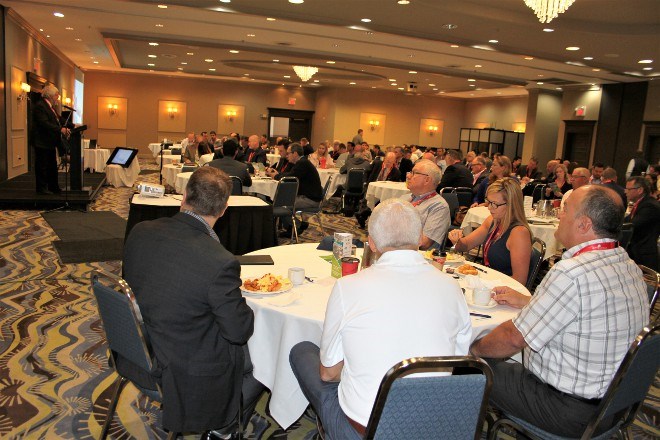Trade tensions between Canada and the United States are not stopping Canadian mining companies from looking south for business opportunities, but they are also looking at markets abroad.
The third annual Northern Ontario Exports Forum in Sudbury on June 27 saw around 200 delegates gather to discuss markets abroad, including Africa, Latin America, Mexico and Europe.
Even though heavy tariffs are being imposed on Canada by the U.S., particularly on steel and aluminium imports, many delegates and speakers said they were concerned, but business is going ahead.
“In terms of the supply and service sector, we are not seeing it,” said Alicia Woods, emcee for the event and general manager of Marcotte Mining Machinery Services and founder of Covergalls Workwear in Sudbury.
“Speaking as an OEM, (original equipment manufacturers), we are going to see increased prices that we procure to build our equipment, because of those big tariffs.”
It's largely a wait-and-see game right now, but with tariffs of 25 per cent for steel alone, Woods said they are preparing for the domino effect of higher prices and costs for products.
Companies are closely watching developments and working with suppliers to understand what's happening. In some cases, companies like hers can forecast prices and budget.
When changes happen this suddenly, she said companies start talking to customers more frequently to understand their needs better and get ahead of potential problems.
“We are working on a fleet of equipment and we were able to get our steel at the quoted price before the tariffs take effect,” she said. “At 25 per cent, that's a huge price increase we were able to get around for this order.”
The intent of the forum is to allow companies and delegates to talk about new and emerging business markets.
There were several presentations on markets in Peru, Argentina, Columbia and Chile, as well as Africa, Mongolia, Australia and even closer to home in British Columbia.
“We are looking at places where there is opportunity, so the Sudbury business sector is aware of those opportunities,” Woods said.
It's also to talk about concerns and the reality of situations like the tariffs.
Although tariffs are something they have to deal with in the short-term, according to many, it won't affect current business dealings.
And in many cases, it's a chance for Canada to forge stronger bonds with current partners.
Ryan McEachern, managing director of MSTA (Mining Suppliers Trade Association) Canada, spoke about business deals between Mexico and Canada while the North American Free Trade Agreement (NAFTA) negotiations are ongoing.
“Now, Mexico needs Canada more than ever,” he said. “With negotiations going through with the U.S....we've seen Mexico opening up more so with Canadian suppliers.
“They are actively looking to change their supply chain, which was historically U.S.-based.”
In the near-term, McEachern predicts exciting changes between the two nations.
On tensions between Canada and the U.S., he hears two things.
In the short-term, if companies can pass along costs associated with tariffs to end users, they will.
However, there are those who cannot because they are bound to tenders and are limited in their bidding actions. They could lose out on winning bids for contracts.
Canadian retaliatory tariffs that go into effect on July 1 will immediately affect prices, and those in long-term request-for-proposals will have to keep their prices the same.
As well, companies are looking to source steel from Europe rather than the U.S.
“It will have a disruptive impact on our business,” McEachern said.
On the positive side, he said this is a wake-up call for Canada to diversify their business dealings.
McEachern and others at the forum reminded delegates there remain markets ready and willing to take Canadian products.
And even with cross-border trade difficulties, many places in the U.S. are actively pursuing Canadian mining business.
Arizona Mining and Industry Get Our Support (AMIGOS) gave several presentations on what the state has to offer with several large mines coming online, including many operations in the state and Latin America that are Canadian-financed.
Dan Neff, chairman for M3 Engineering and Technology Corporation and chairman for AMIGOS, said it's about risk management.
If there is a project or opportunity that can be lucrative, companies and governments will work to get it online.
“There's uncertainty now, but in the process of developing a project, there's a financial model. The sensitivities of the financial model are how we make decisions,” Neff said.
“If it's a robust ore body, it's going to happen. Less robust, may be pushed back or shelved, for a while, depending on the situation.”
Sydney Hay, president of AMIGOS, said they are not feeling much tension from Canadian businesses.
“No one knows how much of this is posturing, versus real, versus trying to get a good deal. So I'm not worried, and I don't think any of our suppliers are worried either."
She pointed out exciting new collaborations are happening between the Canadian, American and Mexican mining companies. The players are not letting politics get in the way of progress.
On why so many Canadian companies are going to the American Southwest, she joked it was the weather, but answered it was due to the sheer number of mines and natural mineral riches that's spurring exploration and development.
The state's history with mining dating back to the late 1880s and with new technology making mining more efficient, companies can extract lower grades, maintain profits and keep people employed.




